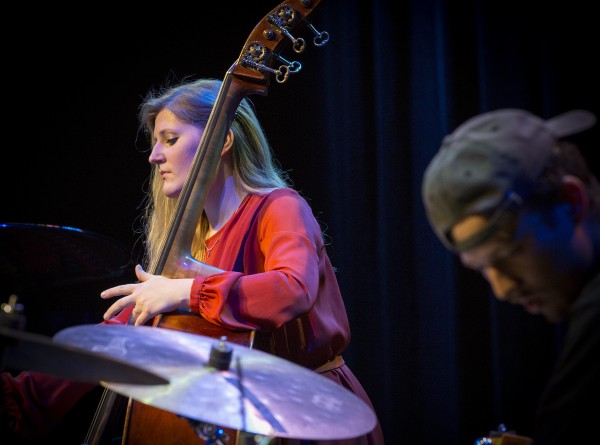Jan 13, 2026 2:09 PM
More Trump-Kennedy Center Cancellations
The fallout from the renaming of the John F. Kennedy Center for the Performing Arts to include President Donald…

The Lisa Wulff Quartett performs May 17 at the Opernhaus during JazzFest Bonn.
(Photo: Heike Fischer)The Rhine cuts a crooked line through Northwest Germany, arching westward gradually, making it easy to compare the river to the nation’s intensifying jazz scene: not straightahead, but not fully free.
The Lisa Wulff Quartett opened the 10th edition of Jazzfest Bonn on May 17 with its namesake leader delivering an unaccompanied bass solo, as the band’s malleable, funky drummer Silvan Strauss waved a pair of brushes in the air at the Opernhaus.
It’s rare that a drummer who’s not leading an ensemble so effortlessly becomes a focal point, but Strauss’ dexterous polyrhythm-pounding limbs were tough to ignore, even as Wulff’s compositions offered ample knotty turns and opportunities for the Hamburg-based troupe to move through straightahead and slightly skronky influences.
Classical vocalist Thomas Quasthoff, who fronted a swinging jazz trio, capped the evening, moving assuredly through transmuted renditions of Tina Turner and Stevie Wonder tunes, and offering a stark arrangement of “Summertime,” turning the Gershwin standard into something gothically dark.
His banter—well received by the audience—was in German, but he sang solely in English, hinting at the States’ ever-present sway over the music, even as the festival’s program sported a bevy of homegrown talent. Cleveland-born tenor saxophonist Joe Lovano, who performed May 18, was part of an American contingent—which included Jason Moran, Tower of Power, Yellowjackets and others at later shows—taking part in the festival, which wraps up May 31.
The next day at Domicil—a Dortmund bar and venue about 90 minutes northeast of Bonn—trombonist Janning Trumann was preparing to present four sets of jazz, improv and rock stuff from ensembles on his label, Tangible Music. (The gig was unaffiliated with the festival.) Trumann, who studied in New York for a few years, recognized the importance of musical and cultural exchange between German and U.S. performers, as well as the inherent difficulties in crossing those borders.
“I don’t know if New York needs Europe,” he wondered aloud before performing in a quartet called Trillmann. “I think they do ... . First of all, the scene is big enough out there. There are so many great musicians; maybe they think, ‘Why do we need European musicians?’ Of course, [European-based players] are good enough and play concerts there. It’s just hard for Europeans to play there—and have an impact on the American scene. I think there is an [influence on the U.S.], but I don’t know exactly what it is.”
For his May 19 set at the venue Pantheon, the final show of JazzFest Bonn’s first weekend, bassist Riccardo Del Fra led a quintet through music he described as “not a holiday postcard.” His point easily was made on a tune called “Children Walking (Through A Minefield).” The performance largely drew from the Paris-based bandleader’s 2018 album Moving People and his meticulous writing, not the combustible component parts of his ensemble, each member clearly displaying a keen grip on the material. A piano-bass rendition of “I’m A Fool To Want You”—a tune Del Fra said he frequently performed alongside Chet Baker during the 1980s—was a brief detour before the band returned to music from his latest batch of compositions.
Shake Stew—an Austrian troupe featuring two drummers behind full kits, two bassists working counterpoint, and a front line of trumpet, alto saxophone and tenor saxophone—capped the evening with more politically tinged fare, including a composition called “No More Silence.”
Earlier that day, just north in Cologne, saxophonist Angelika Niescier sat outside a cafe among a gaggle of lounging international journalists and festival programmers, fielding questions. She chatted about Winterjazz, an area festival she said is partially modeled on New York’s Winter Jazzfest, explaining that she was thrilled by her experience performing there several years ago.
“The awareness, it’s more woven into [New York],” said the bandleader—who has a new album, New York Trio, out on Intakt—while discussing the difficulties in increasing listeners’ familiarity with the music in Germany’s North Rhine-Westphalia region. “I still feel that it’s not the same case in Germany. You still have to put the word out and take care of this for every performance.”
She concluded optimistically: “It’s a gradual process.” DB

Belá Fleck during an interview with Fredrika Whitfield on CNN.
Jan 13, 2026 2:09 PM
The fallout from the renaming of the John F. Kennedy Center for the Performing Arts to include President Donald…

Peplowski first came to prominence in legacy swing bands, including the final iteration of the Benny Goodman Orchestra, before beginning a solo career in the late 1980s.
Feb 3, 2026 12:10 AM
Ken Peplowski, a clarinetist and tenor saxophonist who straddled the worlds of traditional and modern jazz, died Feb. 2…

The success of Oregon’s first album, 1971’s Music Of Another Present Era, allowed Towner to establish a solo career.
Jan 19, 2026 5:02 PM
Ralph Towner, a guitarist and composer who blended multiple genres, including jazz — and throughout them all remained…

Rico’s Anti-Microbial Instrument Swab
Jan 19, 2026 2:48 PM
With this year’s NAMM Show right around the corner, we can look forward to plenty of new and innovative instruments…

Richie Beirach was particularly renowned for his approach to chromatic harmony, which he used to improvise reharmonizations of originals and standards.
Jan 27, 2026 11:19 AM
Richie Beirach, a pianist and composer who channeled a knowledge of modern classical music into his jazz practice,…